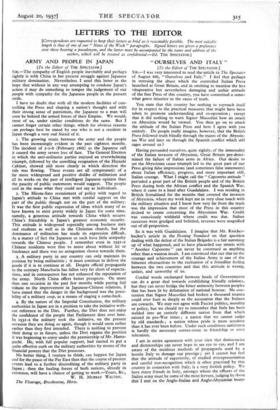LETTERS TO THE EDITOR
[Correspondents are requested to keep their letters as brief as is reasonably possible. The most suitable length is that of one of our " News of the Week" paragraphs. Signed letters are given a preference over those bearing a pseudonym, and the latter must be accompanied by the name and address of the author, which will be treated as confidential.—Ed. THE SPECTATOR.]
ARMY AND PEOPLE IN JAPAN
[To the Editor of THE SPECTATOR.] SIR,—The sympathy of English people inevitably and perhaps rightly is with China in her present struggle against Japanese military domination. Nevertheless I send this letter in the hope that without in any way attempting to condone Japan's action it may do something to temper the judgement of our people with sympathy for the Japanese people in the present strife.
I have no doubt that with all the modern facilities of con-
trolling the Press and shaping a nation's thought and with their strong sense of patriotism, the Japanese to a man will soon be behind the armed forces of their Empire. We would, most of us, under similar conditions do the same. But I cannot forget certain other things, which for obvious reasons can perhaps best be stated by one who is not a resident in Japan though a very real friend of it.
r. The growing strain between the army and the people has been increasingly evident in the past eighteen months. The incident of 2-2-6 (February 26th) as the Japanese call it caused the army severe loss of face. The General Election in which the anti-militarist parties enjoyed an overwhelming triumph, followed by the unwilling resignation of the Hayashi Cabinet, showed still more clearly in which direction the tide was flowing. These events are all symptomatic of a far more widespread and positive dislike of militarism and all its works on the part of intelligent Japanese opinion than the paucity of public statements would suggest. The people said in the mass what they could not say as individuals.
2. The Hirota-Sato restatement of policy with regard to
Japan's attitude to China met with cordial support on the part of the public though not on the part of the military. It was the first public expression of ideas which many of us have known to exist pretty widely in Japan for some time, namely, a generous attitude towards China which secures China's friendship is Japan's greatest economic security. This attitude is widespread especially among business men and students as well as in the Christian church, but the dominance of militarism has made its expression difficult. As a matter of fact the Japanese as such have little antipathy towards the Chinese people. I remember even in 1931-2 Chinese residents were free to move about without let or hindrance and there was no antagonism shown towards them.
3. A military party in any country can only maintain its
position by being militaristic ; it must continue to deliver the goods if it is to continue at all. Despite official propaganda to the contrary Manchuria has fallen very far short of expecta- tions, and in consequence has not enhanced the reputation of the army. North China offers better prospects. On more than one occasion in the past few months while paying full tribute ter the improvement in Japanese-Chinese relations, I have stated that the danger in the background was the possi- bility of a military coup, as a means of staging a come-back.
4. By the nature of the Imperial Constitution, the military authorities in Japan are in a position to take the initiative with-. out reference to the Diet. Further, the Diet does not enjoy the confidence of the people that Parliament does over here. In 1931-2 the military took the initiative, on the present occasion they are doing so again, though it would seem rather earlier than they first intended. There is nothing to prevent their doing so in future, unless the Diet regains the position it was beginning to enjoy under the premiership of Mr. Hama- guchi. He, with full popular support, had started to put a quite effective curb on the military authorities by means of the financial powers that the Diet possesses. No better thing, I venture to think, can happen for Japan
and for the peace of the Far East than that the course of present events lead to a further discrediting of the military party in Japan ; then the healing forces of both nations, already in existence, will have a chance of getting to work.—Yours, &c., W. H. MURRAY WALTON.
The Vicarage, Broxbourne, Herts. The Vicarage, Broxbourne, Herts.






































 Previous page
Previous page